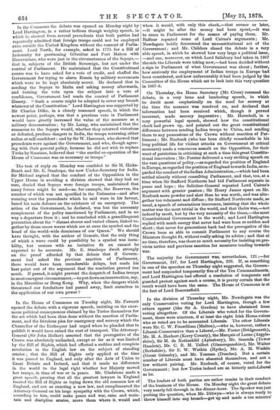In the Commons the debate was opened on Monday night
by Lord Harlington, in a rather tedious though weighty speech, in which he showed from several precedents that both parties had repeatedly admitted that foreign troops could not be employed even outside the United Kingdom without the consent of Parlia- ment. Lord North, for example, asked in 1775 for a Bill of Indemnity for garrisoning Gibraltar and Port Mahon with Hanoverians, who were just in the circumstances of the Sepoys,- that is, subjects of the British Sovereign, but not under the control of Parliament. He maintained that the Constitutional course was to have asked for a vote of credit, and chaffed the Government for trying to alarm Russia by military movements which were to be kept absolutely secret. He declared that in sending the Sepoys to Malta and asking money afterwards, and turning the vote upon the subject into a vote of confidence, Government had made the control of Parliament illusory. " Such a course might be adopted to cover any breach whatever of the Constitution." Lord Hartington was supported by Sir Charles Dilke, in a closely reasoned speech, in which the newest point, perhaps, was that a previous vote in Parliament would have greatly increased the value of the measure as a military demonstration ; by Mr. Laing, who maintained that the summons to the Sepoys would, whether they returned victorious or defeated, produce dangers in India, the troops returning either sullen or self-confident ; and by Sir W. Harcourt, who showed that precedents were against the Government, and who, though agree- ing with their general policy, because he did not wish to replace Turks by Russians, believed that " the cordial co-operation of the House of Commons was as necessary as troops."


































 Previous page
Previous page